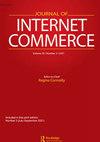Online Compulsive Buying as a Coping Strategy for Self-Uncertainty: The Moderating Role of Gender in China
IF 4.1
Q2 BUSINESS
引用次数: 3
Abstract
Abstract Self-uncertainty is of high relevance for a wide range of thinking and behavior, associated with compulsive buying patterns, since a high level of self-uncertainty is an interfering factor for a stable and consistent self. In turn, online compulsive buying is caused by a wide range of negative personality traits or states. Consequently, self-uncertainty can be viewed as a new important potential predictor for online compulsive buying. With the development of e-commerce, online compulsive buying has been identified as an increasing pathological buying pattern with severe consequences, such as debts, psychological distress and conflicts in partnerships, in particular for female and young consumers. Until now self-uncertainty has not been considered as a factor of influence on either compulsive buying or online compulsive buying. Present research aims to close this gap and investigate whether self-uncertainty affects online compulsive buying and if this effect is moderated by gender. Our sample consisted of Chinese University students (n = 404) who completed the Self-Uncertainty questionnaire , and a modified version of the Bergen Shopping Addiction Scale. We observed that self-uncertainty affects online compulsive buying and that self-uncertainty increases online compulsive buying for females, but not for males.网上强迫购买作为应对自我不确定性的策略:性别在中国的调节作用
摘要自我不确定性与广泛的思维和行为高度相关,与强迫性购买模式有关,因为高度的自我不确定性是稳定和一致的自我的干扰因素。反过来,网上强迫性购买是由一系列负面的性格特征或状态引起的。因此,自我不确定性可以被视为在线强迫性购买的一个新的重要潜在预测因素。随着电子商务的发展,网上强迫性购买已被确定为一种日益病态的购买模式,其后果严重,如债务、心理困扰和伴侣关系冲突,尤其是对女性和年轻消费者而言。到目前为止,自我不确定性还没有被认为是影响强迫性购买或网上强迫性购买的因素。目前的研究旨在缩小这一差距,并调查自我不确定性是否会影响网上强迫性购买,以及这种影响是否受到性别的调节。我们的样本包括中国大学生(n = 404),他们完成了自我不确定性问卷和卑尔根购物成瘾量表的修订版。我们观察到,自我不确定性会影响网上强迫性购买,而自我不确定性则会增加女性的网上强迫性购物,而男性则不然。
本文章由计算机程序翻译,如有差异,请以英文原文为准。
求助全文
约1分钟内获得全文
求助全文
来源期刊

Journal of Internet Commerce
BUSINESS-
CiteScore
10.50
自引率
7.00%
发文量
18
期刊介绍:
The business world has undergone many changes because of information technology, and the impact of the Internet may cause one of the biggest yet. While many people use the Internet for educational and entertainment purposes, organizations and companies are looking for ways to tie their internal networks to this global network to conduct electronic commerce. While companies have been conducting business electronically with suppliers and customers for many years, conducting online commerce via the Internet offers even greater opportunities for multinational, national, and even small businesses to cut costs, improve efficiency, and reach a global market.
 求助内容:
求助内容: 应助结果提醒方式:
应助结果提醒方式:


